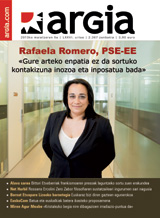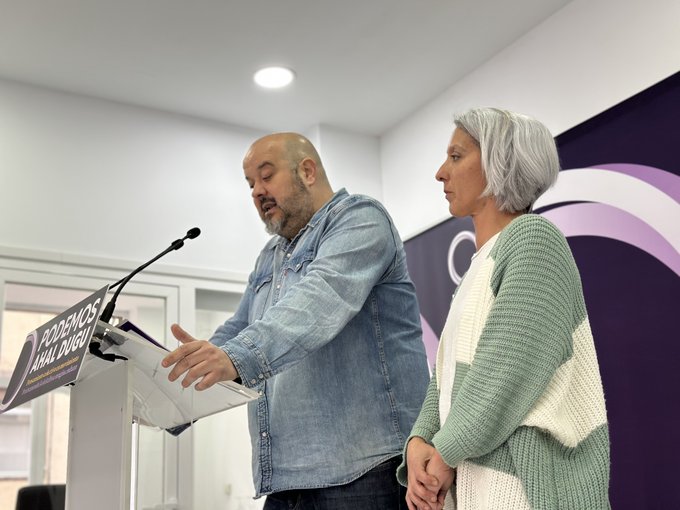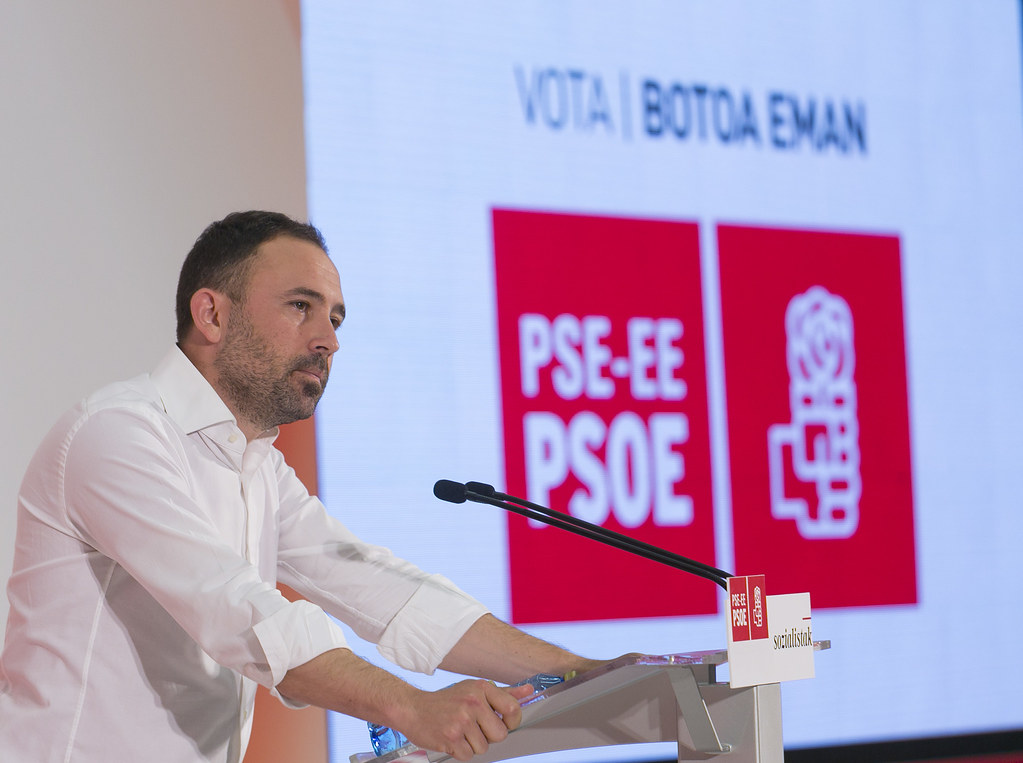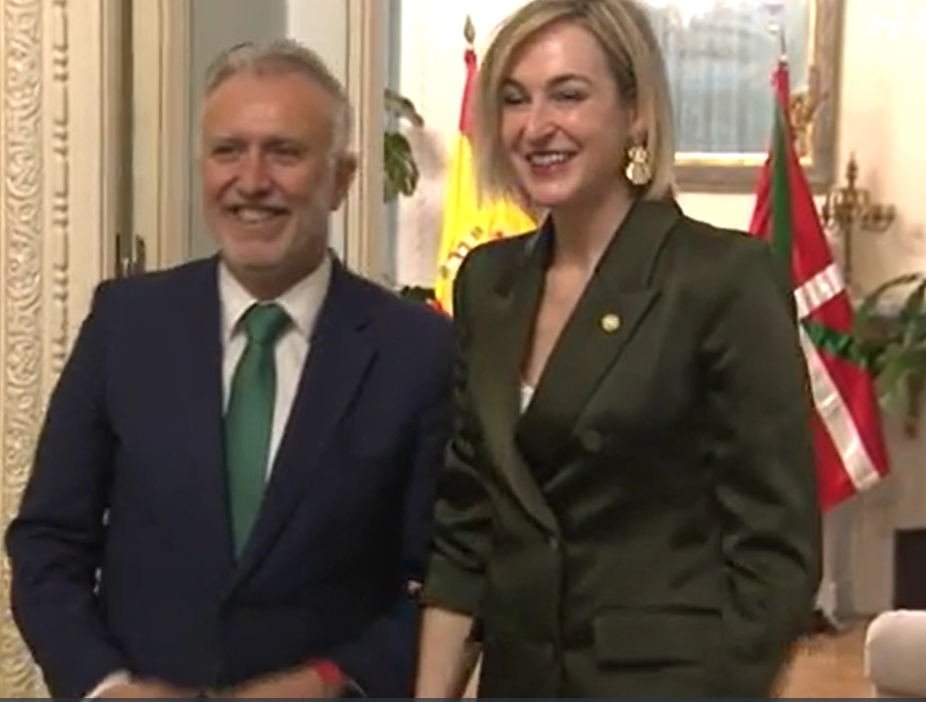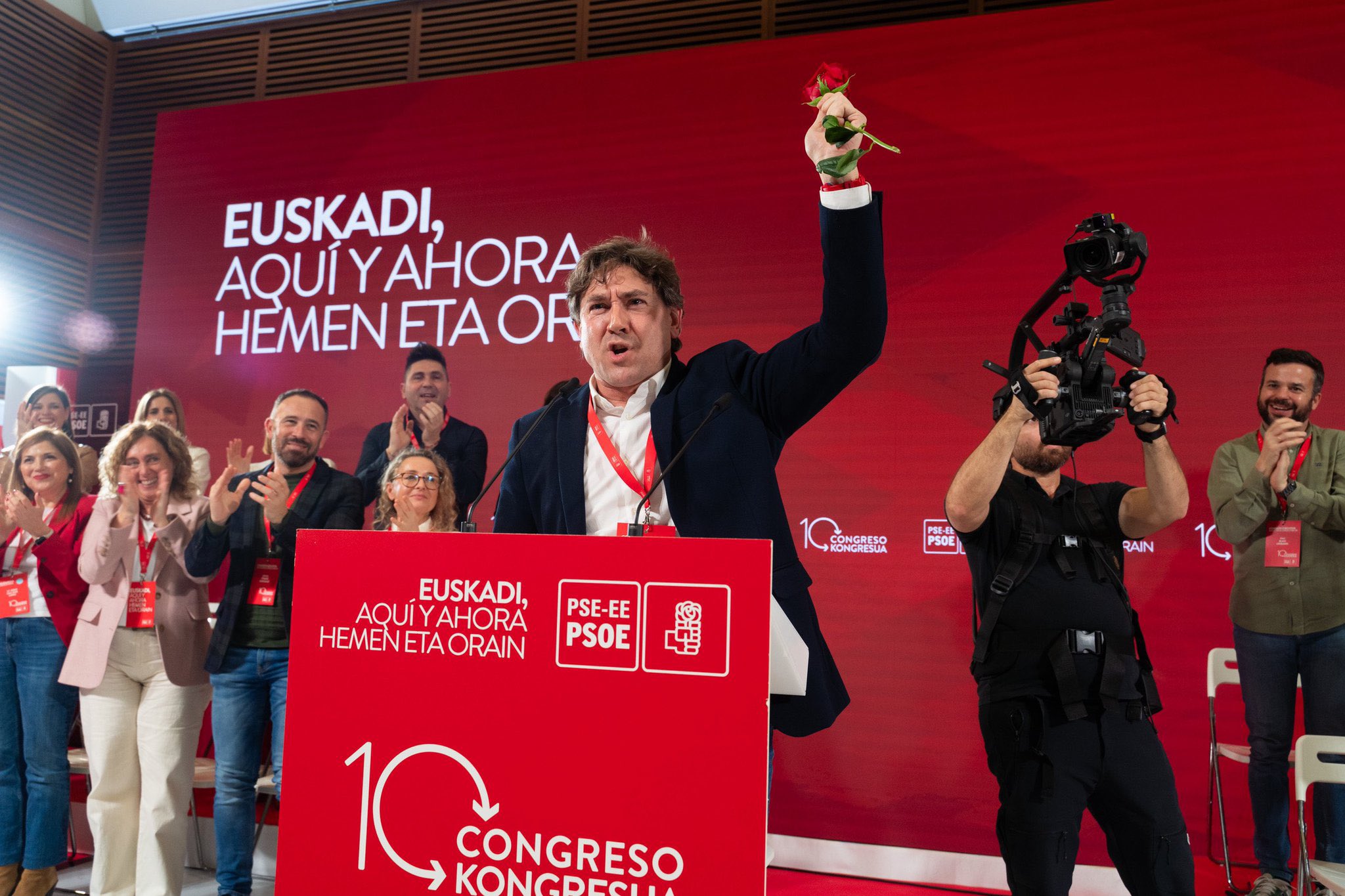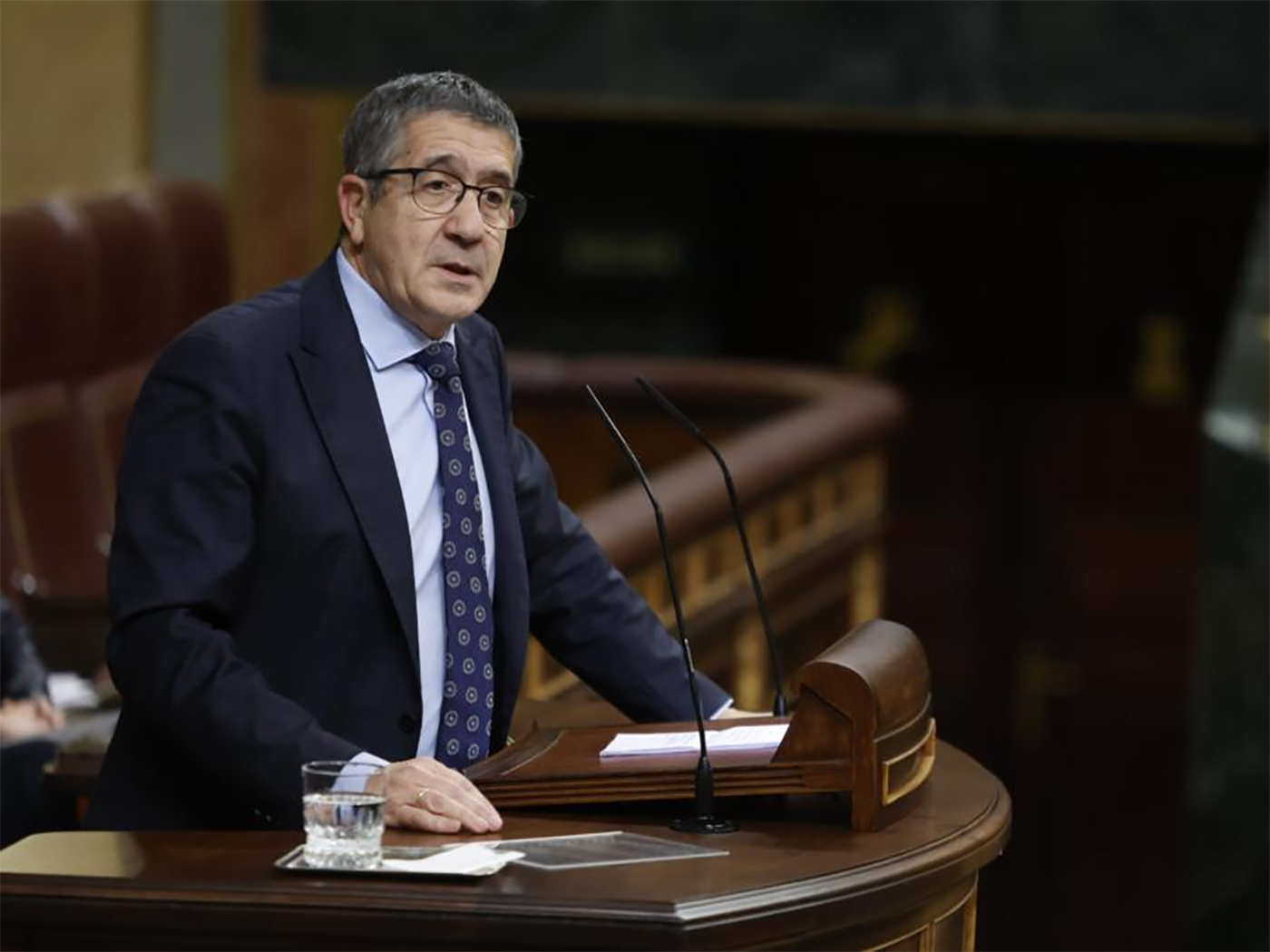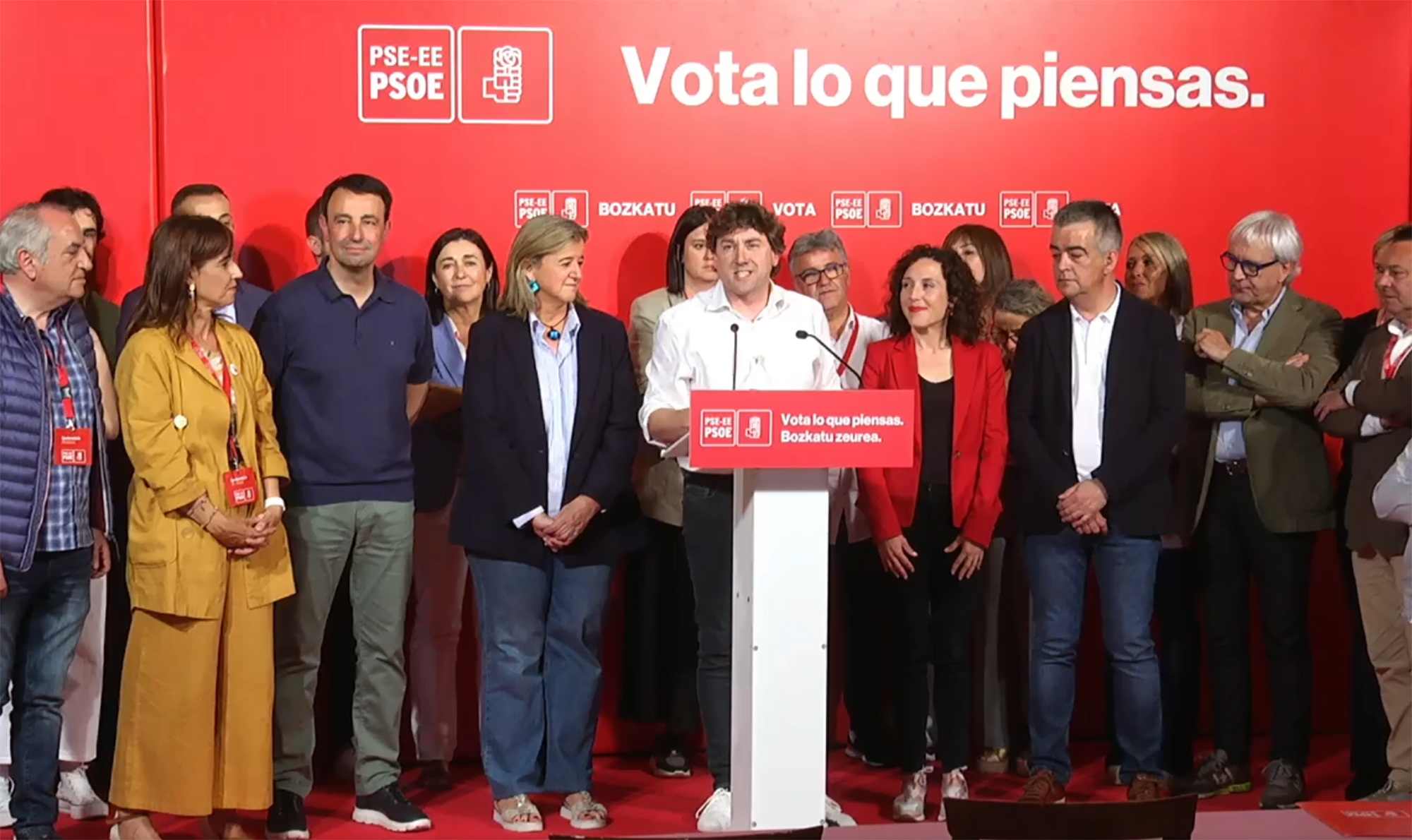"The Gipuzkoans want leftist governments"
- It's from Arrasate. Born in Quintana de la Serena, Badajoz, 1972. Attorney. Member of PSE-EE. Have been a councillor in Mondragón and Pasaia. Former Chairman of the General Boards of Gipuzkoa. Since 1995 he has been a member of the General Boards of Gipuzkoa, initially from the Upper Region and is currently a member of Donostialdea. He is currently the spokesman for the Socialist Group in the Lower House. Expert and trained in foreign and municipal issues.
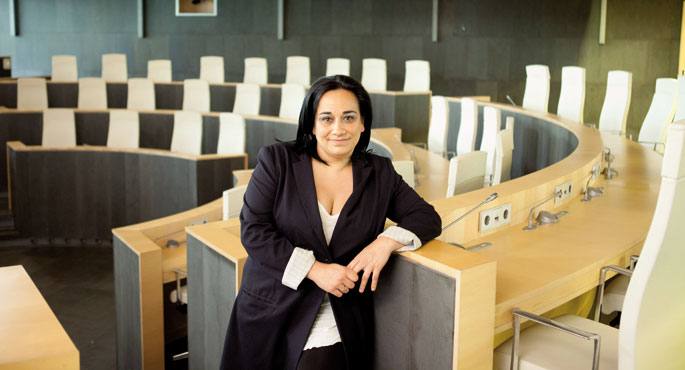
The General Boards have been their political school: “I am very pleased to dedicate myself to Gipuzkoa’s policy. I am very grateful for the personal and political training given to me by the Boards and I am proud to have been their president,” says Rafaela Romero of the PSE-EE.
It's a big driver of public transport. “However, I have not used public transport because between the ages of 20 and 40 I have been with escorts, but I am totally in favour. I’m very passionate, now I’m learning to walk.” Romero is critical of Gipuzkoan public transport – and also that of the Basque Country – that cohesion is very scarce: “I’m from Debabarrena. It's easier to get from Mondragón to Bilbao than to get to San Sebastian. In addition, in Donostialdea it is easier – and cheaper – to walk than in Debabarrena.”
What is the role of women in politics?
Women have political participation through the Equality Act, including the Basque Law. However, from Batasuna to the PP, the projects of all parties are macho, because society is like that. I usually tell Martin Garitano that “also to make revolution, I want the same rights as men have.” Because politics is made primarily after party meetings, every day from 7 p.m. Men in bar associations when playing poteo.
Is it that in times of crisis we have regressed in this area?
Women got the Equality Act, but in practice equality has never been. We've gone back in the crisis, it's been an involution. We have lost achievements. Ours is not a discrimination against any other collective, ours is genetic, since creation. The feminization of poverty and violence has intensified again. This is supported by data from Lanbide and Eustat. In Gipuzkoa it is women who suffer the worst working conditions. And to finish, the PP has erased reconciliation protocols to solve labor disputes in companies.
We are in a moment of reconciliation. You're also talking about the Ahotsak collective. Why? How are you?
I've got to do with Ahotsak, we're people of different ideologies and professions. I am chairman of the peace and standardisation conference of the General Meetings, but the truth is that I prefer not to mix the initiative with the Ahotsak collective. I am proud to be responsible for the report, but I must be careful. Of course, that doesn't take away from acting with Ahotsak's friends. For coexistence and peace are achieved by acting, saying that we must not do so.
Can the status of women facilitate the way in this task?
The voice of women is fundamental in the peace processes, since women have their own character, they have been dependent for centuries on discrimination. Women are sustainable, working and easily committed. It therefore contributes to peace and coexistence.
Pili Zabala, sister of Joxi Zabala, of the Lasa-Zabala case, wrote in the newspaper Berria an article entitled “Eskerrik asko, Rafaela Romero,” after you wrote “Looks at all victims.”
Pili is my friend. I've known him since I wrote the article, we speak Basque, I'm learning a lot with him. I am proud to have written the letter. We have to express what we feel, recognition is due to all victims, but it is essential to know them. Without knowing it, you cannot say “I have made a moral, political and social reparation”. For example, the world of the Union does not know our suffering, so it has not yet fully assumed it.
They say that we are in a new time, but the road to normalisation is blocked. The young people of the case are still incarcerated...
I’ve been with them and I’ve told them “these moments are not easy.” Justice has failed and must be complied with. At this time, however, laws exist and should be used to implement other penitentiary policies. It cannot walk in the moratoriums, but nor can it pretend to bring the victims of ETA closer to the left. Most have not done so. I have heard what they have experienced themselves, and I would like me to know what I have lived twenty years: Hear that I've been under the threat of ETA. There's the solution. These things are not done in Moncloa. At that time, the government of pp has to be accountable to the Basques and to Spain, it has to make peace, but we citizens have to open the way.
There is a long way to go.
Of course. We need to know the families and their suffering. I will turn to the tribute to Santi Brouard – or to the tribute to Zabala and Lasa, which has never been done, and which is not fair – but if I do not know the family, it is pointless. I'll show up in the media, but that's not true. For example, if Laura Mintegi had known Fernando Buesa's family, he would not have said what he said in Parliament, I am convinced of that. And, moreover, it might not be interpreted in the wrong way, as the prosecutor said. But the important thing is not for the prosecutor to say that Mintegi's words are not a crime, but that his words hurt his family.
We have to work and take care of the forms.
Yes. I know Pili Zabala and I will not say that Joxean and Joxi were killed for political reasons. More needs to be done. Empathy among us is not born if the story is innocent and imposed, but through real knowledge.
Has the work of Jesús Egiguren, her husband, been valued in the peace process in Basque society?
Yes. We lack leadership and projects, lack of forces and initiatives that give commitment and hope. Egiguren came to politics to stay, he's the leader, he's going to make history. He has received many loves from people, he has created a school, just like Arnaldo Otegi. They decided for a moment to bet on the new generations in a productive way. With its defects, of course, no one is perfect.
Did you meet Arnaldo Otegi?
No. I went to visit her in jail through Jesus. If Otegi has his past, I will not justify it. However, it is the one of the Abertzale left that has done the most to be in the situation in which we are. In 2003 he sat down with Egiguren and committed to stopping the bleeding.
What is now paying dearly.
Yes, unfortunately. We told the Union “to do politics, to do politics …”. The Otegi group, which had organized the Bateragune to curb the killings, has been placed in pre-trial detention. Of course I do not accept that.
The General Boards of Gipuzkoa and the Provincial Council of Gipuzkoa are working on a different kind of taxation...
I am happy with taxation, because we have taken firm steps to implement the policy that my Secretary-General, Patxi López, called for. In other words, we need a kind of income revolution to guarantee the state of Basque welfare, and not to destroy it, as it intends to do with the budgets presented by lehendakari, Iñigo Urkullu. We have not worked for 30 years to lose the current level of self-government and fiscal autonomy, which is still incomplete, or to pay more for those who have less money and those who have less.
Do you see the possibility of harmonising the tax policies of the CAPV?
Of course. The proposal was adopted by a majority in the Basque Parliament. We are a people, and if one day there is Navarre, so much better. The proposal has been tabled by Bildu and has been put forward with the support of the PSE, as well as that of UPyD. Even though UPyD has said one thing today and tomorrow has done another. In any case, the Government of Iñigo Urkullu is in a minority, will the Basque Government comply with what Parliament has asked for?
What do you think of the Foral Government presided over by Martin Garitano?
That I could do more often. I was expecting something else, really.
You have agreed on taxation, also on budgets...
Yes. Taxation has been improved, budgets have been approved together with the Socialist parties. But Bildu already took over the government in 2011, we're in 2013, and it's just made a mistake. This government received our support for economic promotion and job creation, but there is no anti-crisis plan. One of our budgetary amendments allowed EUR 8 million to be approved and allocated to economic development and employment policy, nothing more has been done. The Government of Garitano does not have a strategic project. Bildu has shortcomings in this area, it is tremendous. The Gipuzkoans, in addition to the projects around the garbage, expect something else, not only that the garbage goes up and down every day.
Difficult times to govern.
But there are means and a lot. The promotion capacity of the Provincial Council is enormous, it has the possibility to manage several areas, but they have done nothing. We need less political propaganda and more social management. GARITANO committed to working for employment and after two years there are no results. Now the priority is to increase social spending to create jobs, unemployment is a social drama, especially for the poorest citizens. We have received a barrage of criticism from other opposition parties: “If you’re crazy,” they tell us. Because Bildu channeled the money transaction with our help.
The agreement on waste has not yet materialised.
I am in favour of the model established by the PIGRUG (General Urban Waste Management Plan of Gipuzkoa), approved by all the other parties. The PIGRUG established a recycling rate. Some of us bet on the fifth container to meet this recycling rate, and there are those who prioritize the door-to-door system. Therefore, “the fifth container is an imposition” and “the door-to-door system is not” cannot be said. Bildu knows that the impositions are not good, neither when the Abertzale left is in government, nor when it is in government. The problem of waste must be solved by a majority agreement between the political parties, and above all between Bildu, the PNV and the PSE, among others. The Government knows that the solution is to reach an agreement among all, there is no other solution.
However, each City Hall can take its own decisions.
Exactly. The agreements are adopted by the plenary session of each municipality, whatever their participation. Consequences? In the elections it will be seen if it has not respected the will of the citizens. It is a municipal competence, of course, that must be respected.
Is the incinerator necessary for you? Nobody's near your house.
Bildu did not quite speak out against the Zubieta incinerator. He says that the project that was there was not well designed. It was disproportionate, too validated. Of course, its use must be well measured. Ecologists, and a lot of people, don't want to. But there are other people, including those on the Abertzale left, who say nothing against the incinerator. Therefore, in the end, we need an agreement between all, and it is possible. The agreement must implicitly have the appropriate size of the project, taking into account the existing infrastructures in Zubieta. Bildu knows that we can reach agreements, and the PNV and us too. Another thing is that the PNV and the Abertzale left should maintain this struggle to defend their interests. I hope that is the opposite.
What links you in Gipuzkoa’s policy with the PNV?
Well, in view of what we have seen in the Gasteiz Parliament, very little. When the PNV wins in Parliament, it loses Gipuzkoa. Gipuzkoa is a very complicated territory, political pluralism is enormous here. The fact that Donostia-San Sebastian is the European Capital of Culture 2016 is a great boost for the city’s transport, infrastructure and economy. Well, the PNV was reluctant. If I had been in Bilbao, no. The PNV is not to the Donostialdea Metro, but to the Bilbao Metro, of course. The goat heads to the mountain and the PNV to Sabin Etxea. Look, we have to go with Navarre, because it is the origin of Euskal Herria, and not of Bizkaia. The situation is disappointing. People are annoyed and from the Gasteiz Government we do not see a strong plan to boost employment. Yes, they are always ready to promote initiatives in favour of private investment.
How do you see Markel Olano?
I don't see it, we don't talk too much. The PNV is out of place. Mr Joseba Egibar wanted to end the Socialist Left in Gipuzkoa. Bildu wanted to govern in the villages he won, in Errenteria, in Donostia or in Lasarte... because the socialists were hurting him. Then, at the same time, it is trying to bind the alternative Government of Garitano so that the left Abertzale, due to its poor management, will gradually turn to the perdition. The Gipuzkoans voted by a majority to Bildu, so Egibar sanctions Gipuzkoa. The policy against this foral government can go well or badly to the PNV, but in the meantime we do not build anything. However, despite the fact that the PNV thinks otherwise, the Gipuzkoans want leftist governments. The political reality is very heady. The future will say so.
PPrekin eta EH Bildurekin negoziazioetan porrot egin ondoren etorri da Ahal Dugurekin adostutako akordioa. Indar politiko honek aitortu duenez, maximalismoak atzean utzi eta errealitateari heldu diote, errenta baxueneko herritarren aldeko akordioa lortuta.
Plataformak "atzerapausotzat" hartu du Eusko Jaurlaritzako Etxebizitza eta Hiri agendako sailburu Denis Itxasok berriki iragarri izana lurzoru urbanizagarrietako etxe babestuen proportzioa %75etik %60ra jaistea. Pradales agintera iritsi zenetik alokairu soziala eskatzen... [+]
2025 amaitu baino lehen Gernikako Estatutuan jasotzen diren eskumen guztiak izatea espero du Jaurlaritzak. Oraindik 25 eskumen falta dira. Transferentzia Batzordea aurreko astean biltzekoa zen baina "agenda arazoak" zirela eta atzeratu zuten.
[[Election graphics 2023 M28 Biscay General Meetings]]
The PNV has achieved a clear victory in the Bizkaia General Meetings (204,560 votes, 38.41%), despite having two runners less than in the previous legislature, with a total of 23. I needed 26 seats to get an absolute... [+]









